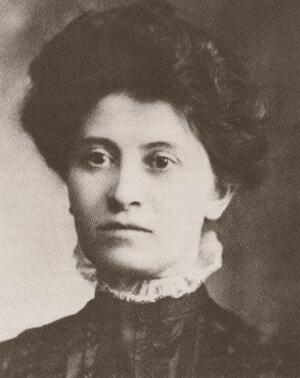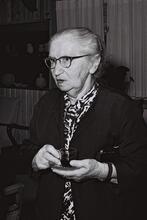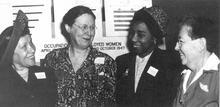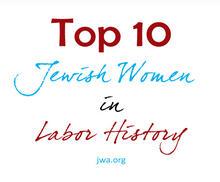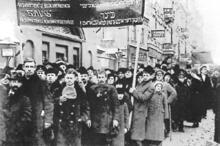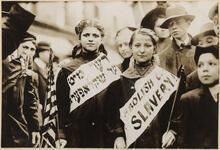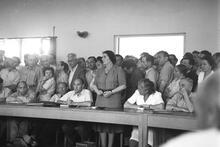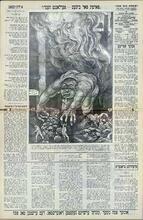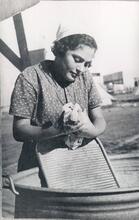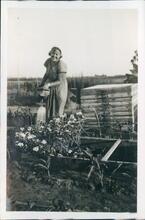Theresa Serber Malkiel
Socialist activist Theresa Serber Malkiel, ca. 1910
From Wikimedia Commons
Theresa Serber Malkiel immigrated to the United States in 1891 and became a garment worker. By 1896 she had become a delegate for the Socialist Trades and Labor Alliance, and despite marriage and motherhood, she remained active in the labor movement. She led the Socialist Party’s National Women’s Committee and argued for women’s right to a greater voice within the party. In 1911, a year before the Triangle Shirtwaist Fire, Malkiel wrote Diary of a Shirtwaist Maker; after the tragedy her book helped fuel public support to reform labor laws. Malkiel eventually shifted away from using socialism as a vehicle for change and began a second career in adult education, founding the Brooklyn Adult Students Association in the 1920s.
Theresa Malkiel was an activist for labor, women’s rights, and especially socialism. In one of her many published articles, she wrote, “The socialist regime [is] the only true exponent of complete equality and political economic independence.”
Family and Early Career
Theresa Serber Malkiel, one of four daughters, was born on May 1, 1874, in Bar, Russia. The Serber family immigrated to New York in 1891, and although she had been educated, Theresa worked in a garment factory. Within three years, she helped found the Infant Cloak Makers’ Union.
Malkiel fought fiercely for the rights of workers. Several showdowns in her factory resulted in considerable media publicity, and her role in the union was noted. She became the first woman to rise from factory work to leadership in the Socialist Party. She was appointed delegate to the initial convention of the Socialist Trades and Labor Alliance in 1896. From that year, she was considered an insider in the Socialist Labor Party. She broke with them in 1899 and a year later joined the Socialist Party of America.
Theresa stopped working in 1900 to marry Leon Malkiel, a fellow socialist and longtime friend. The couple moved to Yonkers, New York, and Theresa Malkiel took up housekeeping and gave birth to a daughter, Henrietta. But she could not give up her commitment to working women. Malkiel organized the Women’s Progressive Society of Yonkers, which later became Branch One of the Socialist Women’s Society of Greater New York.
Socialist Activism
When the general strike of 1909 began, Malkiel went to New York to join the picket line. In the course of that strike, the Socialist Party leaders made an alliance with the Women’s Trade Union League. Although suspicious of their antisocialist position, Malkiel worked closely with the WTUL, signing up new members, speaking at meetings, and raising funds. She saw this strike as a chance for women to join with men and become emancipated. In an article that appeared on December 4, 1909, in the New York Call, a socialist journal she and her husband founded, she wrote, “Comrades, every movement has its opportunities, this is ours.”
Malkiel’s high hopes for women in socialism never materialized. Once the strike was over, the unions became the champions of working people, while the Socialist Party lost status. Malkiel blamed this new attitude on middle-class reformers who “came down from their pedestals to preach,” and on socialist men, who were rarely committed to women’s equality.
Continuing her outreach to immigrant working women, Malkiel headed the party’s National Women’s Committee. She justified a parallel women’s socialist party with the explanation that women are “tired of their [party] positions as official cake-bakers and money collectors.” When she was offered the job of setting up a suffrage movement within the party, she followed the instructions of the International and established clubs designed to attract working women. Still, the ultimate goal of bringing more people to socialism remained elusive. By 1914, the party leadership withdrew funds from the National Women’s Committee and the program was discontinued.
Malkiel wrote Diary of a Shirtwaist Maker a year before the Triangle Shirtwaist Fire in 1911. After the fire, the book caught public attention and was credited with helping to reform New York State laws on women in industry. Malkiel continued her political activities through World War I. She went on two nationwide tours for the Socialist Party, speaking for women’s rights and against United States participation in the war.
Post-World War I Career
The antiwar position of the socialists, combined with the disillusionment that set in after the Russian Revolution, ended most of the enthusiasm for socialism in the United States. Malkiel’s husband was now a lawyer and had run unsuccessfully for several statewide offices. Then, Theresa Malkiel ran for New York State Assembly in 1920 on the Socialist ticket but lost by a small margin.
Following that defeat, Malkiel concentrated exclusively on adult education. She founded the Brooklyn Adult Students Association and acted as administrator for its classes and summer camp, working toward the education and naturalization of foreign-born women.
Theresa Serber Malkiel died on November 17, 1949. By that time, her role as a radical socialist and union organizer had been largely forgotten. Instead, she was described as “widow of a well-known New York lawyer” who had devoted the last twenty years of her life to education. The headline to her obituary read: “Retired Writer, A Founder of Old New York Call, Aided Adult Study.”
AJHQ 68:189–205.
Buhle, Mari Jo. Women and American Socialism: 1870–1920 (1983).
Kvidera, Peter. "Rewriting the ghetto: Cultural production in the labor narratives of Rose Schneiderman and Theresa Malkiel." American Quarterly 57, no. 4 (2005): 1131-1154.
Malkiel, Theresa Serber. Diary of a Shirtwaist Maker (1910).
Miller, Sally M. “From Sweatshop Worker to Labor Leader: Theresa Malkiel, a Case Study.” American Jewish History 68 (December 1978): 189–205.
Obituary. NYTimes, November 18, 1949, 29:3.

